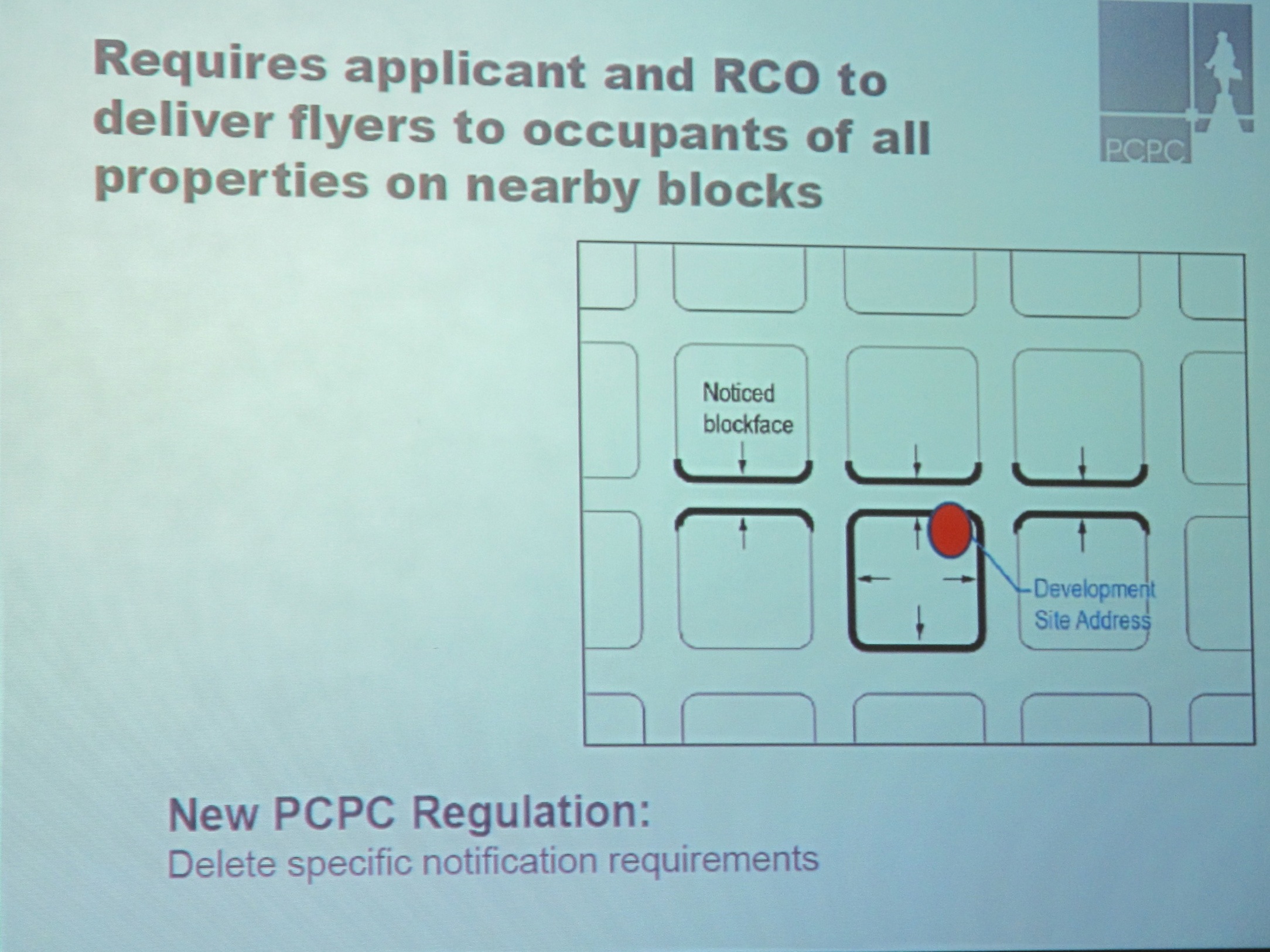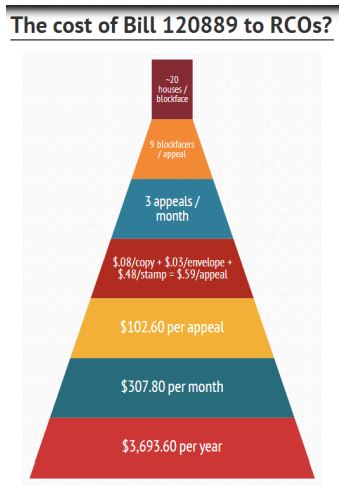Worried about an ‘unfunded mandate,’ PCPC adopts regulations to comply with Blackwell bill

The Planning Commission adopted amendments to its rules and regulations Tuesday afternoon to bring them in line with Councilwoman Jannie Blackwell’s contentious bill amending the new zoning regulations for Registered Community Organizations. Some neighborhood groups are worried that the bill, which is set to take effect on Monday, will put an extra burden on their backs.
The bill makes a handful of changes to the RCO process laid out in the zoning code that was adopted last August.
· The code currently requires zoning applicants to notify any RCO whose boundaries contain the proposed development. Blackwell’s bill requires applicants—and moreover, RCOs themselves—to notify every resident on the 9 adjacent blocks of the proposed project.
· The bill would permit multiple meetings between developers and separate community groups, whereas the code currently requires RCOs to convene a single meeting.
· The Civic Design Review Committee, which reviews the public impact of large projects, currently includes a representative of one RCO whose boundaries contain the proposed project. Blackwell’s bill allows for two RCOs to be represented, and additionally allows the District Council member to appoint a representative.
Read the Planning Commission’s description of the changes here.
David Goldfarb, zoning chair for East Passyunk Crossing Civic Association, said that he is on board with the intention of the bill—which Blackwell has said is to further cement the community’s role in development—but is worried that the notice requirements will be too costly. He calculates that the bill as currently written could cost RCOs thousands of dollars a year in printing and distribution costs for zoning notices.
“When Council passed the bill, it surely did not consider that requiring individual notice to nine “blockfaces” … means that a zoning appeal would require notification to be delivered to 180 households per zoning appeal based on average city block face with twenty single family houses,” Goldfarb wrote in a letter. “Depending on the legal interpretation of the bill’s wording, RCOs in areas with apartment buildings might face a more extreme hardship: think of notifying every residence in all the apartment buildings in a Center City neighborhood. And Council must not have considered that it is against federal law to place a flyer inside a mailbox (18 U.S.C. 1725) nor that leaving notifications outside the household’s door would significantly worsen Philadelphia’s trash problem.”
During the Planning Commission’s hearing yesterday, Chairman Alan Greenberger summed up the Administration’s view on the matter.
“We’re not very happy with a lot of this,” Alan Greenberger said. “We attempted to negotiate what we thought was a better arrangement. We weren’t successful at it. Council passed it. The Mayor vetoed the legislation. Council overrode his veto. So now we’re in a position of needing to adjust our regulations to accommodate this; we don’t have a choice unless the law is revisited.”
Commission staffer Richard Redding and Commissioner Nilda Ruiz both referred to the notification changes as an “unfunded mandate.”
Jihad Ali, president of the Philadelphia chapter of the National Association of Minority Contractors, testified in support of Blackwell’s changes at the Commission meeting on Tuesday.
“This was the mandate of the people by the representatives of the people, who are the City Council, elected people,” Ali said.
Ed Panek, a member of Logan Square Neighborhood Association, echoed Goldfarb’s concern about the potential cost of the new regulations.
“We understand the purpose of the ordinance was to create inclusiveness,” Panek said. “Part of the problem is that, with respect to the drafting of the bill, it’s duplicative, and it creates many onerous burdens in terms of notification.”
Reached on Wednesday, Councilwoman Blackwell said she didn’t intend to create an extra burden for RCOs, and doesn’t think that the bill will cause any real problems.
“All of this is grassroots up,” Blackwell said. “This came from the community up. This is what the community groups asked for, so we thought that the community had a good way to be notified if you get it from [the applicant and the RCO]—then people know.”
Councilwoman Blackwell initially introduced the changes after being contacted by the group Concerned Citizens of Point Breeze, which had fought in several public hearings before the Planning Commission and City Council against certain provisions of the zoning code. She said she thinks leaving flyers in the lobby of an apartment building would be sufficient notification of the building’s residents.
“[The Commission] keeps insisting there’s a problem where we don’t see one,” Blackwell said. “Having said that, we’re always open to discussions on how to make it clearer.”
Contact the reporter at jbrey@planphilly.com and follow him on Twitter @jaredbrey

WHYY is your source for fact-based, in-depth journalism and information. As a nonprofit organization, we rely on financial support from readers like you. Please give today.




